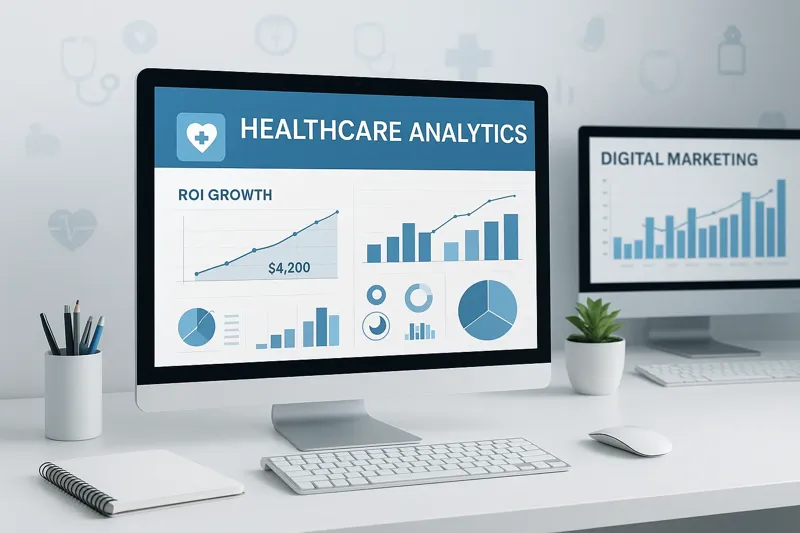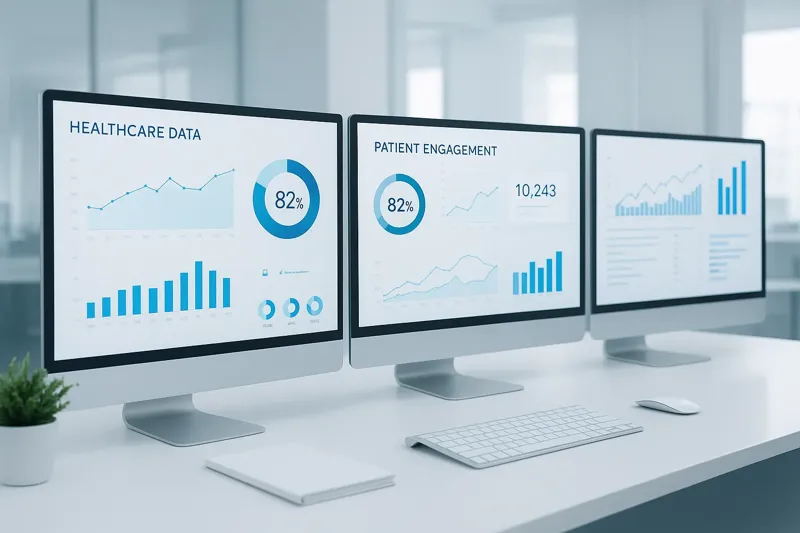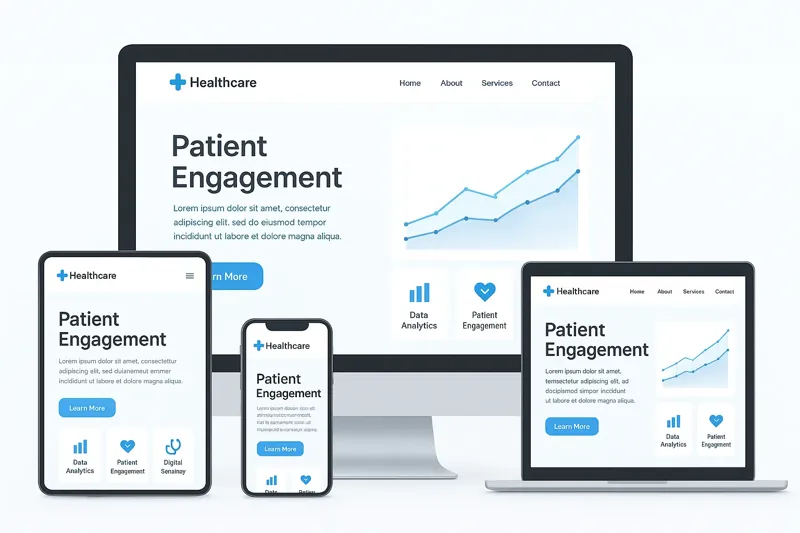Understanding the Power of Online Reputation in Healthcare
In today's digital-first world, a healthcare provider's online reputation significantly influences patient trust, engagement, and choice. With nearly all consumers relying on online reviews to evaluate healthcare services, managing this presence is essential not only for attracting new patients but also for fostering long-term growth and credibility. This article explores strategies healthcare organizations can employ to build and maintain a positive online reputation, enhancing visibility, patient satisfaction, and competitive advantage.
The Critical Role of Online Reviews in Patient Decision-Making

How do online reviews influence healthcare patients' decisions?
Online reviews play a vital role in guiding patients' choices when seeking healthcare services. Studies reveal that up to 98% of consumers depend on these reviews, often consulting over 19 different opinions before deciding on a provider. Patients prioritize key aspects of online feedback, including the number of reviews, star ratings (with a strong preference for at least 4 stars), detailed comments, and how recent the reviews are (Healthcare Online Reputation Statistics, Importance of Online Reviews in Healthcare, Online Reviews Influence Patient Choices).
Positive reviews enhance trust and credibility, encouraging patient loyalty and increasing the likelihood of new patient acquisition (Building Trust Through Online Reputation, Healthcare Patient Engagement Strategies). Conversely, insufficient or negative reviews can deter potential patients, highlighting the importance of maintaining a positive online presence (Responding to Negative Healthcare Reviews, Healthcare Reputation Crisis Management.
Importance of Positive Reviews and Star Ratings
Patients generally require a healthcare provider to have a minimum of 4 stars to be considered trustworthy and competent. Healthcare practices boasting star ratings above 4.5 and abundant recent reviews stand out in search results, improving their visibility and attracting more patients (Impact of Google Reviews on SEO, Google Reviews for Healthcare Providers). These ratings also impact search engine optimization (SEO), making Google reviews especially influential (Boosting Healthcare Provider Google Rankings.
Key Healthcare Review Platforms
The main platforms patients use to research healthcare providers include:
| Platform | Usage Percentage | Description |
|---|---|---|
| 74% | Dominant platform for reviews and local search visibility (Google Healthcare Reviews | |
| WebMD | 55% | Trusted for detailed medical and provider information (WebMD Healthcare Ratings |
| Healthgrades | 31% | Popular for ratings and patient feedback on doctors (Healthgrades Review Platform |
These websites serve as reliable sources of information that shape patient perceptions and influence their final decisions (Healthcare review platforms overview, Top healthcare review platforms.
Online reviews, testimonials, and star ratings collectively build trust and drive patient engagement, making online reputation management an essential part of healthcare marketing and patient acquisition strategies (Improve Healthcare Reputation Management, Healthcare Reputation Management Strategies, Reputation management in healthcare).
Establishing a Strong Online Presence Across Platforms

What foundational steps should healthcare providers take to establish their online presence?
Healthcare providers should begin by claiming and optimizing their profiles on key directories and review platforms. These include Google Business Profile, Healthgrades, Yelp, RateMDs, and Zocdoc. Keeping information accurate and up to date across these sites is essential to enhance local search visibility and patient trust (Healthcare reputation management, Reputation management for doctors, Healthcare reputation management.
Consistent Name, Address, and Phone Number (NAP) listings are critical for both reputation and SEO benefits. Inconsistencies can confuse patients and reduce search engine ranking (Online reviews impact healthcare provider choice, The importance of accurate business listings.
Building and maintaining active social media profiles on platforms such as Facebook, LinkedIn, and Instagram helps healthcare organizations engage directly with their community, share educational content, and humanize the brand (Hospital Online Reputation Management, Social media for healthcare education, Engage with patient feedback.
An SEO-optimized, mobile-friendly website that offers clear information and valuable educational resources establishes authority and supports better search engine rankings. Such websites improve patient experience by providing easy access to services and practitioner profiles (Improving healthcare reputation management, Healthcare brand online presence, Optimizing online profiles for healthcare professionals).
Together, these strategies form a strong foundation for a trusted, visible, and credible online presence essential to attract and retain patients in a competitive healthcare market (Reputation Management Strategies in Healthcare, Healthcare reputation management 2024.
Encouraging and Managing Patient Reviews Effectively
Strategies to solicit authentic patient feedback
Healthcare providers can encourage patients to leave genuine reviews by asking shortly after appointments when patient satisfaction peaks. Methods include sending automated emails and text messages, using in-clinic QR codes, and making review requests easy and accessible. Prompt follow-up communications also boost patient engagement. For detailed tactics on this topic, see Healthcare reputation management strategies.
Use of digital tools and automation for review collection
Automation tools like Emitrr and Chatmeter streamline the process of requesting, collecting, and monitoring patient reviews efficiently. These platforms support HIPAA compliance by ensuring responses and data handling protect patient confidentiality. They consolidate reviews in a single dashboard to facilitate timely professional responses. Learn more about Review and reputation management for healthcare and Reputation management for doctors.
Importance of review volume and review recency
Patients often consider both the number and freshness of reviews when choosing a healthcare provider. A steady flow of recent reviews is critical, as about 73% of consumers focus more on reviews from the last month. Higher review volume helps increase visibility and builds greater trust among prospective patients. See Mastering Healthcare Reputation Management in 2024 for current statistics and insights on review behavior.
Ethical considerations and HIPAA compliance
When managing reviews, providers must respond professionally without disclosing protected health information. Ensuring that all communications respect patient privacy and are HIPAA-compliant builds trust and safeguards the practice. Ethical management includes encouraging honest feedback while avoiding manipulation or fake reviews. For guidelines on compliance and ethical reputation management, refer to Healthcare reputation management solutions and Emitrr's HIPAA-safe reputation management.
Proactively encouraging authentic, recent reviews through compliant automated platforms enhances online reputation, increases patient trust, and supports better search engine rankings. Learn more on improving reputation and increasing patient trust at Improve Healthcare Reputation Management.
Responding to Reviews to Build Trust and Credibility

Why and How Should Healthcare Organizations Respond to Online Patient Reviews?
Responding promptly to patient reviews—ideally within 24 to 48 hours—is critical for demonstrating that a healthcare organization values patient feedback. Timely, professional, and empathetic communication, especially when addressing negative reviews, indicates a commitment to patient satisfaction and continuous improvement. It is important that responses maintain HIPAA compliance by avoiding any disclosure of private health information (Reputation management solution, Healthcare reputation management strategies).
Timeliness and Tone in Responding to Reviews
Quick responses show attentiveness and respect towards patients. The tone must be courteous and empathetic, whether the feedback is positive or negative. Personalized replies, rather than generic messages, build a stronger connection with patients and reflect the practice’s dedication to quality care (Importance of Online Reviews in Healthcare, Responding to patient feedback effectively.
Handling Positive and Negative Feedback Professionally
Acknowledging compliments in positive reviews with gratitude reinforces patient loyalty. Negative feedback should be addressed with understanding, offering to take the conversation offline if necessary, which helps resolve concerns while protecting patient privacy. Professional handling of all feedback can turn dissatisfied patients into advocates (Responding to Online Reviews Professionally, Handling Negative Reviews with Empathy).
Demonstrating Commitment to Patient Satisfaction
Engaging with reviews publicly highlights a healthcare provider’s dedication to excellent care and responsiveness. It encourages other patients to share their experiences, cultivating a transparent and trustworthy environment (Building Trust Through Online Reputation, Encouraging Patient Reviews.
Impact of Responses on Reputation and Patient Perceptions
Well-managed review responses enhance the overall reputation and influence patient decision-making. Prospective patients often interpret thoughtful engagement as a sign of higher quality care, which can lead to increased trust, patient retention, and new patient acquisition (Boosting Healthcare Provider Google Rankings, Healthcare Online Reputation Statistics.
Enhancing Patient Experience to Foster Positive Reviews
How does patient experience influence online reputation in healthcare?
Exceptional patient experiences are central to a strong online reputation in healthcare. Personalized care, where each patient feels uniquely valued, combined with effective communication, leads to higher patient satisfaction and trust. This foundation directly translates into positive online reviews and testimonials.
Personalized care and effective communication
Providing personalized care means understanding each patient's specific needs and concerns. When healthcare professionals communicate clearly, listen actively, and show empathy, patients are more likely to feel comfortable and confident in the care they receive. Such interactions increase the likelihood of patients sharing positive feedback online.
Training staff for patient engagement
Staff training is crucial in delivering a consistent patient experience. Equipping staff with skills in empathy, active listening, and conflict resolution results in more meaningful patient interactions. This commitment to patient engagement not only helps in managing expectations but also fosters loyalty and encourages patients to leave supportive reviews.
Continuous improvement through feedback analysis
Regular collection and analysis of patient feedback—including sentiment analysis of reviews—allow healthcare providers to identify strengths and areas for improvement. This continuous loop of feedback helps in refining services and addressing concerns promptly, further boosting patient satisfaction and online reputation.
Relationship between patient experience and online reputation
There is a strong connection between patient experience and online reputation. Delivering high-quality care consistently builds trust and motivates patients to recommend their healthcare provider. Positive patient interactions foster word-of-mouth referrals and generate authentic endorsements that are critical in influencing future patients' decisions.
Leveraging Technology and Reputation Management Platforms
What technological solutions support effective online reputation management in healthcare?
Healthcare providers increasingly rely on specialized reputation management platforms to handle the complex landscape of online reviews and patient feedback. Tools like Press Ganey, Emitrr, Chatmeter, and DemandHub consolidate reviews and ratings from multiple sources—including major review sites and social media—into a single, unified dashboard. This consolidation allows providers to monitor their online presence efficiently and ensures no patient comment goes unnoticed.
These platforms offer powerful features such as sentiment analysis, which helps healthcare organizations understand patient values, uncover areas needing quality improvement, and guide targeted service adjustments. Automated review request systems simplify the feedback collection process, encouraging satisfied patients to leave positive reviews at the right moment.
Integration with Electronic Medical Records (EMR) systems further enriches the insights, providing a comprehensive view that links patient experiences with clinical data. Many platforms incorporate AI and automation technologies that enable real-time alerts for new feedback and assist in composing timely, HIPAA-compliant responses to maintain professionalism while safeguarding patient privacy.
Streamlined team workflows are supported through configurable roles and permissions, which facilitate collaboration across departments while maintaining adherence to privacy regulations and organizational protocols. This functionality ensures consistent, coordinated responses and that every team member operates within their scope, improving both efficiency and compliance.
Adopting these advanced reputation management platforms empowers healthcare providers to actively manage their digital presence, build patient trust, and foster growth in an increasingly competitive healthcare market.
Optimizing Google Business Profile and Local SEO for Visibility
How does optimizing Google Business Profile enhance healthcare providers’ online reputation and visibility?
Google Business Profile optimization is crucial for healthcare providers aiming to boost their online reputation and local visibility. By maintaining consistent and accurate listings—including crucial details like address, phone number, and hours of operation—providers increase patient trust and enhance their rankings in local search results. For more on this topic, see Healthcare Online Reputation Management Tips.
Maintaining consistent, accurate listings on Google My Business
Ensuring that your Google My Business profile is up-to-date and consistent with other online listings (NAP: Name, Address, Phone) across multiple platforms is essential. This consistency helps search engines verify your practice’s legitimacy and improves local SEO, allowing patients to find you quickly and easily. Learn more about Accurate institution listings and Local SEO for healthcare.
Role of Google reviews and star ratings in SEO
Google reviews directly influence search rankings. Practices with more positive reviews—especially those maintaining ratings above 4.5 stars—signal trustworthiness to Google, improving rankings and online credibility. Encouraging patients to leave genuine, timely reviews and responding professionally to them builds engagement and further elevates visibility. More details are available at Impact of Google Reviews on SEO and Review and reputation management for healthcare.
Best practices for local search visibility
Regularly post updates and photos, actively manage reviews, and engage with patient feedback on your Google Business Profile. This not only improves your practice’s SEO but also strengthens patient relationships. Complement profile optimization with localized content on your website to provide greater context and relevance. Refer to Hospital Online Reputation Management for practical advice.
Impact of higher ratings on search ranking and patient trust
High star ratings boost patient confidence and enhance click-through rates. Research shows that patients prefer providers with ratings above 4.5, associating these scores with quality care and professionalism. Improved ratings also contribute positively to your search engine placement, creating a virtuous cycle between visibility and patient acquisition. See Healthcare Online Reputation Statistics for supporting data.
Harnessing Social Media to Strengthen Online Reputation

What role does social media play in healthcare reputation management?
Social media serves as a powerful tool for healthcare providers to enhance their online reputation. Active engagement on popular platforms like Facebook, Instagram, and LinkedIn helps build trust by sharing educational content, answering patient questions, and showcasing both professional expertise and compassionate care (Building trust in healthcare, Social Media Engagement for Healthcare, Using Social Media for Patient Engagement.
Building engagement through patient education and interaction
Healthcare organizations use social media to educate patients about health topics, treatments, and services. This interactive approach fosters a well-informed patient base while demonstrating the provider’s commitment to transparent and helpful communication (Educational healthcare resources, Healthcare patient engagement strategies, Engaging patients through social media.
Showcasing expertise and compassionate care
Regularly updating social profiles with expert insights, success stories, and behind-the-scenes glimpses lets providers humanize their service. Such content highlights the care and knowledge patients can expect, reinforcing positive perceptions and credibility (Building Trust Through Online Reputation, Sharing patient testimonials, Healthcare brand identity and differentiation).
Managing professional and personal social media presence
Maintaining separate, professionally managed accounts ensures consistent, HIPAA-compliant messaging. Staff training on social media policies helps prevent privacy breaches and maintains the organization’s professional image (Healthcare privacy and compliance, HIPAA compliance in review responses, Training staff for patient service).
Social media’s role in community trust and brand awareness
Beyond patient interactions, social media strengthens community ties by showcasing outreach efforts and healthcare achievements. This heightened visibility enhances brand awareness and serves as a complement to online reviews, collectively influencing patient choices and loyalty (Building brand trust in healthcare, Healthcare reputation and culture, Attracting new patients through reputation.
Measuring and Monitoring Online Reputation Effectiveness

How can healthcare providers measure and monitor the effectiveness of their online reputation management?
Healthcare organizations need to continuously track several key metrics to gauge the health of their online reputation. These metrics include the volume of patient reviews, average star ratings, and sentiment analysis of review content. Monitoring tools such as Google Alerts and social listening platforms enable real-time detection of brand mentions and emerging concerns.
Tracking Reviews Quantity, Sentiment, and Ratings
Keeping an eye on the total number of patient reviews helps assess engagement and reputation growth. Tracking average star ratings offers a snapshot of overall patient satisfaction, while sentiment analysis dives deeper into the emotional tone, highlighting specific areas of praise or concern. These practices are essential components of healthcare reputation management strategies.
Analyzing Website Traffic and Patient Engagement Metrics
Increased website visits, longer session durations, and higher engagement rates with educational content indicate growing trust and interest from patients. These metrics complement review data by showing how patients interact with the provider online, an important factor in building trust through online reputation.
Using Surveys and Patient Feedback Tools
Deploying patient satisfaction surveys, especially those measuring Net Promoter Scores (NPS), provides direct insights into patient loyalty and likelihood to recommend. These surveys uncover actionable feedback that may not surface through online reviews alone and are key to improving patient experience and satisfaction.
Continuous Improvement Based on Data Insights
By analyzing review trends, patient feedback, and site engagement, healthcare providers can identify strengths and areas needing improvement. Promptly addressing negative feedback and building on positive elements helps maintain a favorable reputation and fosters patient trust over time, supporting effective online reputation management in healthcare.
Crisis Management and Handling Negative Feedback
How should healthcare providers handle negative reviews and reputation crises?
Timely and professional responses to negative reviews are crucial for healthcare providers to mitigate reputational harm. When patients post negative feedback, providers should respond empathetically and respectfully, demonstrating accountability and commitment to quality care. For detailed strategies, see Reputation management for doctors.
It is essential that responses comply with HIPAA regulations, avoiding any disclosure of protected health information (PHI). Providers are encouraged to take sensitive matters offline for resolution to protect patient privacy and foster more personal communication. Learn more about HIPAA-compliant reputation management tools.
Having a crisis management plan is vital. Such a plan enables rapid identification and response to negative media or social media incidents, helping to contain the impact before it escalates. For guidance, review Handling Negative Reviews and Reputation Crisis Plans.
Transparency in addressing concerns and publicly acknowledging mistakes when appropriate helps rebuild trust. Additionally, actively implementing improvements based on patient feedback shows dedication to enhancing the care experience. Explore best practices in Healthcare reputation management strategies.
By combining these strategies, healthcare organizations build resilience against future crises, preserving patient trust and safeguarding their reputation in the competitive healthcare landscape. For an overview of improve healthcare reputation management and reputation growth, see this resource.
Sustaining a Positive Online Reputation in Healthcare
An exceptional online reputation is foundational for healthcare providers seeking to build trust, attract new patients, and remain competitive in a digitally driven healthcare landscape. By implementing strategies such as optimizing online presences, actively soliciting and managing patient reviews, engaging on social media responsibly, and leveraging advanced reputation management technologies, healthcare organizations can enhance patient satisfaction and drive sustainable growth. Continuous monitoring, professional responsiveness, and commitment to exceptional patient experience ensure that a positive reputation endures, supporting both short-term success and long-term brand integrity.
Understanding the Power of Online Reputation in Healthcare
In today's digital-first world, a healthcare provider's online reputation significantly influences patient trust, engagement, and choice. With nearly all consumers relying on online reviews to evaluate healthcare services, managing this presence is essential not only for attracting new patients but also for fostering long-term growth and credibility. This article explores strategies healthcare organizations can employ to build and maintain a positive online reputation, enhancing visibility, patient satisfaction, and competitive advantage.
The Critical Role of Online Reviews in Patient Decision-Making

How do online reviews influence healthcare patients' decisions?
Online reviews play a vital role in guiding patients' choices when seeking healthcare services. Studies reveal that up to 98% of consumers depend on these reviews, often consulting over 19 different opinions before deciding on a provider. Patients prioritize key aspects of online feedback, including the number of reviews, star ratings (with a strong preference for at least 4 stars), detailed comments, and how recent the reviews are (Healthcare Online Reputation Statistics, Importance of Online Reviews in Healthcare, Online Reviews Influence Patient Choices).
Positive reviews enhance trust and credibility, encouraging patient loyalty and increasing the likelihood of new patient acquisition (Building Trust Through Online Reputation, Healthcare Patient Engagement Strategies). Conversely, insufficient or negative reviews can deter potential patients, highlighting the importance of maintaining a positive online presence (Responding to Negative Healthcare Reviews, Healthcare Reputation Crisis Management.
Importance of Positive Reviews and Star Ratings
Patients generally require a healthcare provider to have a minimum of 4 stars to be considered trustworthy and competent. Healthcare practices boasting star ratings above 4.5 and abundant recent reviews stand out in search results, improving their visibility and attracting more patients (Impact of Google Reviews on SEO, Google Reviews for Healthcare Providers). These ratings also impact search engine optimization (SEO), making Google reviews especially influential (Boosting Healthcare Provider Google Rankings.
Key Healthcare Review Platforms
The main platforms patients use to research healthcare providers include:
| Platform | Usage Percentage | Description |
|---|---|---|
| 74% | Dominant platform for reviews and local search visibility (Google Healthcare Reviews | |
| WebMD | 55% | Trusted for detailed medical and provider information (WebMD Healthcare Ratings |
| Healthgrades | 31% | Popular for ratings and patient feedback on doctors (Healthgrades Review Platform |
These websites serve as reliable sources of information that shape patient perceptions and influence their final decisions (Healthcare review platforms overview, Top healthcare review platforms.
Online reviews, testimonials, and star ratings collectively build trust and drive patient engagement, making online reputation management an essential part of healthcare marketing and patient acquisition strategies (Improve Healthcare Reputation Management, Healthcare Reputation Management Strategies, Reputation management in healthcare).
Establishing a Strong Online Presence Across Platforms

What foundational steps should healthcare providers take to establish their online presence?
Healthcare providers should begin by claiming and optimizing their profiles on key directories and review platforms. These include Google Business Profile, Healthgrades, Yelp, RateMDs, and Zocdoc. Keeping information accurate and up to date across these sites is essential to enhance local search visibility and patient trust (Healthcare reputation management, Reputation management for doctors, Healthcare reputation management.
Consistent Name, Address, and Phone Number (NAP) listings are critical for both reputation and SEO benefits. Inconsistencies can confuse patients and reduce search engine ranking (Online reviews impact healthcare provider choice, The importance of accurate business listings.
Building and maintaining active social media profiles on platforms such as Facebook, LinkedIn, and Instagram helps healthcare organizations engage directly with their community, share educational content, and humanize the brand (Hospital Online Reputation Management, Social media for healthcare education, Engage with patient feedback.
An SEO-optimized, mobile-friendly website that offers clear information and valuable educational resources establishes authority and supports better search engine rankings. Such websites improve patient experience by providing easy access to services and practitioner profiles (Improving healthcare reputation management, Healthcare brand online presence, Optimizing online profiles for healthcare professionals).
Together, these strategies form a strong foundation for a trusted, visible, and credible online presence essential to attract and retain patients in a competitive healthcare market (Reputation Management Strategies in Healthcare, Healthcare reputation management 2024.
Encouraging and Managing Patient Reviews Effectively
Strategies to solicit authentic patient feedback
Healthcare providers can encourage patients to leave genuine reviews by asking shortly after appointments when patient satisfaction peaks. Methods include sending automated emails and text messages, using in-clinic QR codes, and making review requests easy and accessible. Prompt follow-up communications also boost patient engagement. For detailed tactics on this topic, see Healthcare reputation management strategies.
Use of digital tools and automation for review collection
Automation tools like Emitrr and Chatmeter streamline the process of requesting, collecting, and monitoring patient reviews efficiently. These platforms support HIPAA compliance by ensuring responses and data handling protect patient confidentiality. They consolidate reviews in a single dashboard to facilitate timely professional responses. Learn more about Review and reputation management for healthcare and Reputation management for doctors.
Importance of review volume and review recency
Patients often consider both the number and freshness of reviews when choosing a healthcare provider. A steady flow of recent reviews is critical, as about 73% of consumers focus more on reviews from the last month. Higher review volume helps increase visibility and builds greater trust among prospective patients. See Mastering Healthcare Reputation Management in 2024 for current statistics and insights on review behavior.
Ethical considerations and HIPAA compliance
When managing reviews, providers must respond professionally without disclosing protected health information. Ensuring that all communications respect patient privacy and are HIPAA-compliant builds trust and safeguards the practice. Ethical management includes encouraging honest feedback while avoiding manipulation or fake reviews. For guidelines on compliance and ethical reputation management, refer to Healthcare reputation management solutions and Emitrr's HIPAA-safe reputation management.
Proactively encouraging authentic, recent reviews through compliant automated platforms enhances online reputation, increases patient trust, and supports better search engine rankings. Learn more on improving reputation and increasing patient trust at Improve Healthcare Reputation Management.
Responding to Reviews to Build Trust and Credibility

Why and How Should Healthcare Organizations Respond to Online Patient Reviews?
Responding promptly to patient reviews—ideally within 24 to 48 hours—is critical for demonstrating that a healthcare organization values patient feedback. Timely, professional, and empathetic communication, especially when addressing negative reviews, indicates a commitment to patient satisfaction and continuous improvement. It is important that responses maintain HIPAA compliance by avoiding any disclosure of private health information (Reputation management solution, Healthcare reputation management strategies).
Timeliness and Tone in Responding to Reviews
Quick responses show attentiveness and respect towards patients. The tone must be courteous and empathetic, whether the feedback is positive or negative. Personalized replies, rather than generic messages, build a stronger connection with patients and reflect the practice’s dedication to quality care (Importance of Online Reviews in Healthcare, Responding to patient feedback effectively.
Handling Positive and Negative Feedback Professionally
Acknowledging compliments in positive reviews with gratitude reinforces patient loyalty. Negative feedback should be addressed with understanding, offering to take the conversation offline if necessary, which helps resolve concerns while protecting patient privacy. Professional handling of all feedback can turn dissatisfied patients into advocates (Responding to Online Reviews Professionally, Handling Negative Reviews with Empathy).
Demonstrating Commitment to Patient Satisfaction
Engaging with reviews publicly highlights a healthcare provider’s dedication to excellent care and responsiveness. It encourages other patients to share their experiences, cultivating a transparent and trustworthy environment (Building Trust Through Online Reputation, Encouraging Patient Reviews.
Impact of Responses on Reputation and Patient Perceptions
Well-managed review responses enhance the overall reputation and influence patient decision-making. Prospective patients often interpret thoughtful engagement as a sign of higher quality care, which can lead to increased trust, patient retention, and new patient acquisition (Boosting Healthcare Provider Google Rankings, Healthcare Online Reputation Statistics.
Enhancing Patient Experience to Foster Positive Reviews
How does patient experience influence online reputation in healthcare?
Exceptional patient experiences are central to a strong online reputation in healthcare. Personalized care, where each patient feels uniquely valued, combined with effective communication, leads to higher patient satisfaction and trust. This foundation directly translates into positive online reviews and testimonials.
Personalized care and effective communication
Providing personalized care means understanding each patient's specific needs and concerns. When healthcare professionals communicate clearly, listen actively, and show empathy, patients are more likely to feel comfortable and confident in the care they receive. Such interactions increase the likelihood of patients sharing positive feedback online.
Training staff for patient engagement
Staff training is crucial in delivering a consistent patient experience. Equipping staff with skills in empathy, active listening, and conflict resolution results in more meaningful patient interactions. This commitment to patient engagement not only helps in managing expectations but also fosters loyalty and encourages patients to leave supportive reviews.
Continuous improvement through feedback analysis
Regular collection and analysis of patient feedback—including sentiment analysis of reviews—allow healthcare providers to identify strengths and areas for improvement. This continuous loop of feedback helps in refining services and addressing concerns promptly, further boosting patient satisfaction and online reputation.
Relationship between patient experience and online reputation
There is a strong connection between patient experience and online reputation. Delivering high-quality care consistently builds trust and motivates patients to recommend their healthcare provider. Positive patient interactions foster word-of-mouth referrals and generate authentic endorsements that are critical in influencing future patients' decisions.
Leveraging Technology and Reputation Management Platforms
What technological solutions support effective online reputation management in healthcare?
Healthcare providers increasingly rely on specialized reputation management platforms to handle the complex landscape of online reviews and patient feedback. Tools like Press Ganey, Emitrr, Chatmeter, and DemandHub consolidate reviews and ratings from multiple sources—including major review sites and social media—into a single, unified dashboard. This consolidation allows providers to monitor their online presence efficiently and ensures no patient comment goes unnoticed.
These platforms offer powerful features such as sentiment analysis, which helps healthcare organizations understand patient values, uncover areas needing quality improvement, and guide targeted service adjustments. Automated review request systems simplify the feedback collection process, encouraging satisfied patients to leave positive reviews at the right moment.
Integration with Electronic Medical Records (EMR) systems further enriches the insights, providing a comprehensive view that links patient experiences with clinical data. Many platforms incorporate AI and automation technologies that enable real-time alerts for new feedback and assist in composing timely, HIPAA-compliant responses to maintain professionalism while safeguarding patient privacy.
Streamlined team workflows are supported through configurable roles and permissions, which facilitate collaboration across departments while maintaining adherence to privacy regulations and organizational protocols. This functionality ensures consistent, coordinated responses and that every team member operates within their scope, improving both efficiency and compliance.
Adopting these advanced reputation management platforms empowers healthcare providers to actively manage their digital presence, build patient trust, and foster growth in an increasingly competitive healthcare market.
Optimizing Google Business Profile and Local SEO for Visibility
How does optimizing Google Business Profile enhance healthcare providers’ online reputation and visibility?
Google Business Profile optimization is crucial for healthcare providers aiming to boost their online reputation and local visibility. By maintaining consistent and accurate listings—including crucial details like address, phone number, and hours of operation—providers increase patient trust and enhance their rankings in local search results. For more on this topic, see Healthcare Online Reputation Management Tips.
Maintaining consistent, accurate listings on Google My Business
Ensuring that your Google My Business profile is up-to-date and consistent with other online listings (NAP: Name, Address, Phone) across multiple platforms is essential. This consistency helps search engines verify your practice’s legitimacy and improves local SEO, allowing patients to find you quickly and easily. Learn more about Accurate institution listings and Local SEO for healthcare.
Role of Google reviews and star ratings in SEO
Google reviews directly influence search rankings. Practices with more positive reviews—especially those maintaining ratings above 4.5 stars—signal trustworthiness to Google, improving rankings and online credibility. Encouraging patients to leave genuine, timely reviews and responding professionally to them builds engagement and further elevates visibility. More details are available at Impact of Google Reviews on SEO and Review and reputation management for healthcare.
Best practices for local search visibility
Regularly post updates and photos, actively manage reviews, and engage with patient feedback on your Google Business Profile. This not only improves your practice’s SEO but also strengthens patient relationships. Complement profile optimization with localized content on your website to provide greater context and relevance. Refer to Hospital Online Reputation Management for practical advice.
Impact of higher ratings on search ranking and patient trust
High star ratings boost patient confidence and enhance click-through rates. Research shows that patients prefer providers with ratings above 4.5, associating these scores with quality care and professionalism. Improved ratings also contribute positively to your search engine placement, creating a virtuous cycle between visibility and patient acquisition. See Healthcare Online Reputation Statistics for supporting data.
Harnessing Social Media to Strengthen Online Reputation

What role does social media play in healthcare reputation management?
Social media serves as a powerful tool for healthcare providers to enhance their online reputation. Active engagement on popular platforms like Facebook, Instagram, and LinkedIn helps build trust by sharing educational content, answering patient questions, and showcasing both professional expertise and compassionate care (Building trust in healthcare, Social Media Engagement for Healthcare, Using Social Media for Patient Engagement.
Building engagement through patient education and interaction
Healthcare organizations use social media to educate patients about health topics, treatments, and services. This interactive approach fosters a well-informed patient base while demonstrating the provider’s commitment to transparent and helpful communication (Educational healthcare resources, Healthcare patient engagement strategies, Engaging patients through social media.
Showcasing expertise and compassionate care
Regularly updating social profiles with expert insights, success stories, and behind-the-scenes glimpses lets providers humanize their service. Such content highlights the care and knowledge patients can expect, reinforcing positive perceptions and credibility (Building Trust Through Online Reputation, Sharing patient testimonials, Healthcare brand identity and differentiation).
Managing professional and personal social media presence
Maintaining separate, professionally managed accounts ensures consistent, HIPAA-compliant messaging. Staff training on social media policies helps prevent privacy breaches and maintains the organization’s professional image (Healthcare privacy and compliance, HIPAA compliance in review responses, Training staff for patient service).
Social media’s role in community trust and brand awareness
Beyond patient interactions, social media strengthens community ties by showcasing outreach efforts and healthcare achievements. This heightened visibility enhances brand awareness and serves as a complement to online reviews, collectively influencing patient choices and loyalty (Building brand trust in healthcare, Healthcare reputation and culture, Attracting new patients through reputation.
Measuring and Monitoring Online Reputation Effectiveness

How can healthcare providers measure and monitor the effectiveness of their online reputation management?
Healthcare organizations need to continuously track several key metrics to gauge the health of their online reputation. These metrics include the volume of patient reviews, average star ratings, and sentiment analysis of review content. Monitoring tools such as Google Alerts and social listening platforms enable real-time detection of brand mentions and emerging concerns.
Tracking Reviews Quantity, Sentiment, and Ratings
Keeping an eye on the total number of patient reviews helps assess engagement and reputation growth. Tracking average star ratings offers a snapshot of overall patient satisfaction, while sentiment analysis dives deeper into the emotional tone, highlighting specific areas of praise or concern. These practices are essential components of healthcare reputation management strategies.
Analyzing Website Traffic and Patient Engagement Metrics
Increased website visits, longer session durations, and higher engagement rates with educational content indicate growing trust and interest from patients. These metrics complement review data by showing how patients interact with the provider online, an important factor in building trust through online reputation.
Using Surveys and Patient Feedback Tools
Deploying patient satisfaction surveys, especially those measuring Net Promoter Scores (NPS), provides direct insights into patient loyalty and likelihood to recommend. These surveys uncover actionable feedback that may not surface through online reviews alone and are key to improving patient experience and satisfaction.
Continuous Improvement Based on Data Insights
By analyzing review trends, patient feedback, and site engagement, healthcare providers can identify strengths and areas needing improvement. Promptly addressing negative feedback and building on positive elements helps maintain a favorable reputation and fosters patient trust over time, supporting effective online reputation management in healthcare.
Crisis Management and Handling Negative Feedback
How should healthcare providers handle negative reviews and reputation crises?
Timely and professional responses to negative reviews are crucial for healthcare providers to mitigate reputational harm. When patients post negative feedback, providers should respond empathetically and respectfully, demonstrating accountability and commitment to quality care. For detailed strategies, see Reputation management for doctors.
It is essential that responses comply with HIPAA regulations, avoiding any disclosure of protected health information (PHI). Providers are encouraged to take sensitive matters offline for resolution to protect patient privacy and foster more personal communication. Learn more about HIPAA-compliant reputation management tools.
Having a crisis management plan is vital. Such a plan enables rapid identification and response to negative media or social media incidents, helping to contain the impact before it escalates. For guidance, review Handling Negative Reviews and Reputation Crisis Plans.
Transparency in addressing concerns and publicly acknowledging mistakes when appropriate helps rebuild trust. Additionally, actively implementing improvements based on patient feedback shows dedication to enhancing the care experience. Explore best practices in Healthcare reputation management strategies.
By combining these strategies, healthcare organizations build resilience against future crises, preserving patient trust and safeguarding their reputation in the competitive healthcare landscape. For an overview of improve healthcare reputation management and reputation growth, see this resource.
Sustaining a Positive Online Reputation in Healthcare
An exceptional online reputation is foundational for healthcare providers seeking to build trust, attract new patients, and remain competitive in a digitally driven healthcare landscape. By implementing strategies such as optimizing online presences, actively soliciting and managing patient reviews, engaging on social media responsibly, and leveraging advanced reputation management technologies, healthcare organizations can enhance patient satisfaction and drive sustainable growth. Continuous monitoring, professional responsiveness, and commitment to exceptional patient experience ensure that a positive reputation endures, supporting both short-term success and long-term brand integrity.






